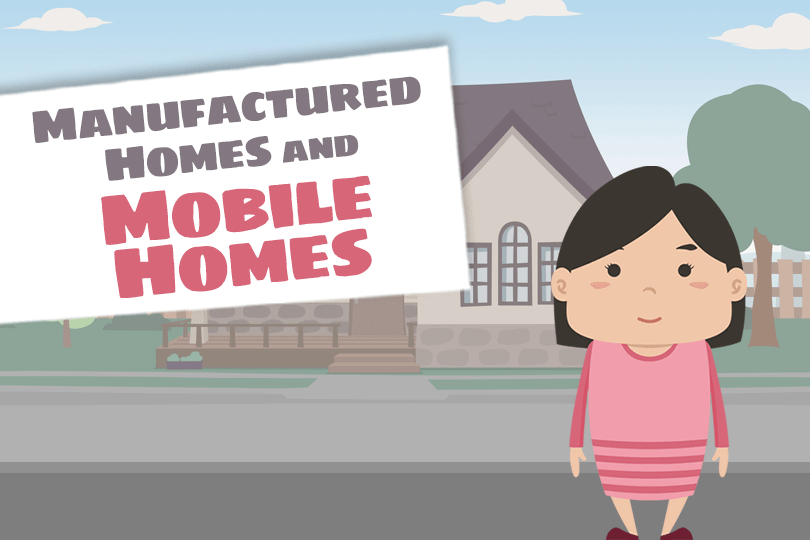Mobile, Manufactured, and Modular Homes: Now You Know
October 17, 2022
So let’s go over these building types and learn about what makes them different than any other house on the block.
Mobile Homes
Technically speaking, every mobile home in America was built before 1976. To understand this distinction, you’ll need to learn how and why mobile homes came about in the first place. In 1945, much of the U.S. workforce was sent to fight in World War II, which created a vacuum in the manufacturing industry. To accommodate for this loss, the government set up housing communities with mobile homes and trailers around large factories for the new, temporary workers coming in from around the country.
When veterans returned from the war to start over and rejoin the workforce, demand for these mobile homes grew overnight. This led to them being constructed quickly and poorly, giving them a reputation that Americans still believe to this day.
So why is the date, June 15, 1976 a deadline for these houses to be termed “mobile homes?”
Manufactured Homes
Mobile homes kept gaining popularity over the years, but they were also evolving, becoming longer and wider and looking more like regular homes than trailers. In 1974, the HUD submitted the National Mobile Home Construction and Safety Act (the “HUD code”). This reclassified “mobile homes” as “manufactured homes” and established new construction and safety standards, addressing essential home systems issues such as heating, plumbing, and electrical wiring. Unlike mobile homes, manufactured homes are built in factories, minimizing factors that can weaken construction, such as weather damage and human error. To be classified as a manufactured home, the structure must have a steel chassis and welded tongue for towing to the homesite, and must carry an exterior HUD ID tag and interior manufacturer’s data plate.
Modular Homes
A new reiteration of manufactured homes came with “modular housing.” Similar to manufactured homes, modular homes are built in an indoor setting, but the separate sections of the home are built without steel chassis or towing gear. They are then transported on flatbed trucks and assembled at the homesite. These modular homes appear almost indecipherable from site-built homes, and are subject to the same local and state housing rules and regulations. Unlike manufactured homes that can be set on blocks, masonry, footings or a permanent foundation, modular homes must have a permanent foundation.
Some advantages that modular homes have over homes built on-site are the design flexibility for the buyer, ability to move the home entirely, and quick, indoor construction.
Does the FHA Allow It?
Many potential homebuyers are surprised to learn that the FHA allows approved lenders to finance manufactured and modular homes. To be eligible for FHA mortgage insurance, the manufactured home must be built after June 15, 1976 (which means NO mobile homes), and there must be a certification label to prove it. It also mandates that manufactured home floorspace cannot be smaller than 400 square feet and must be classified as real estate.
Additionally, the FHA allows borrowers to apply for the FHA One-Time Close loan program on both manufactured and modular homes. Learn more about the FHA’s One-Time Close loan process.
------------------------------
RELATED VIDEOS:
Here's the Scoop on Conventional Loans
When Do You Need a Cosigner?
Analyzing Your Debt Ratio

FHA Loan Articles
April 14, 2025 Buying a home with an FHA loan can be an exciting and achievable goal. This quick quiz helps you gauge your understanding of FHA loans and what it takes to make a winning offer on your new dream home. Take a few moments to answer the questions and see how prepared you are to navigate this crucial stage of your home-buying journey.
March 31, 2025Is 2025 the right year for you to consider an FHA streamline refinance? These mortgages are for those who want a lower interest rate, a lower monthly payment, or to move out of an adjustable-rate mortgage and into a fixed-rate loan. We examine some of the critical features of FHA streamline refinances.
March 27, 2025Did you know there are FHA loans that let house hunters buy multi-family properties such as duplexes and triplexes? FHA rules for these transactions is found in HUD 4000.1, including owner-occupancy, require that one unit serve as the borrower’s primary residence. Some house hunters ask why this rule exists. Some believe the rule serves as a lender risk mitigation strategy.
March 25, 2025What does it take to sell a house purchased with an FHA mortgage? Are there special rules, restricrtions, or added considerations? We examine some key questions and their answers to FHA real estate sales issues.
March 24, 2025If you are selling a home, you may need to negotiate with buyers to fund their purchases with an FHA mortgage. What do you, as a seller, need to know about FHA mortgages and how they may differ from conventional loans? We examine some common issues.







